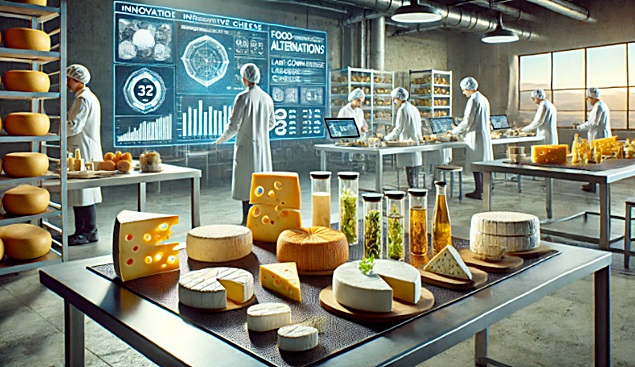1166

Artisanal and Continental Cheese Sales Thrive Amid Cost-of-Living Crisis, Says DairyReporter
The Comforts of Home
Despite the continued impact of the pandemic and the ongoing cost-of-living crisis across many industries, some claim these challenges have fueled strong sales in artisan and continental cheese categories, according to DairyReporter.
This is largely attributed to consumers eating out less frequently and instead choosing to indulge in affordable luxuries they can enjoy at home.
The European Union (EU) is home to hundreds of Protected Designation of Origin (PDO) and Protected Geographical Indication (PGI) cheeses that have stood the test of time. Italy’s Conciato Romano is often cited as the oldest cheese in the world, dating back to the Roman Empire.
This enduring dedication to craftsmanship and authenticity is increasingly appealing to consumers, driving demand for lesser-known cheeses such as Chaource PDO, Morbier PDO, and Ossau-Iraty PDO.
According to Patrick McGuigan, cheese writer, educator, and advisor to the More than Food and Drink campaign, supermarkets that upgraded their cheese selections with higher quality and more artisanal options have seen a noticeable rise in sales.
McGuigan also notes the success of ready-to-serve cheese boards, which include small portions of various European PDO cheeses, each labeled with a name flag.
Award-winning selections include more familiar cheeses like Bleu d’Auvergne PDO and Saint Nectaire PDO, alongside rarer offerings in British supermarkets such as Maroilles PDO and Tomme de Brebis.
These affordable, high-quality assortments have been embraced by discerning shoppers. Now, British cheesemakers are looking to replicate this success with their own ready-made artisanal collections.
Innovation Driving Sustainability
The EU aims to become the first carbon-neutral continent by 2050—a bold ambition considering the greenhouse gas emissions (GHG) generated by the agricultural sector. Still, the EU acknowledges that sustainable food systems are increasingly vulnerable to environmental degradation and climate change.
Urgent action is needed to reduce environmental stress and protect food security and farmers' livelihoods.
A key takeaway from the EU's Strategic Dialogue on the Future of Agriculture is that sustainability must be inclusive and accessible, ensuring that food systems work for everyone. There is also a strong belief that tackling the full environmental footprint of food requires initiatives across the entire supply chain—from farm to food waste.
Since 2017, the EU has supported initiatives to reduce the environmental impact of the dairy industry. One such initiative is LIFE The Tough Get Going (TTGG), a project focusing on cheese production in France and Italy, aiming to enhance supply chain efficiency and lower the Product Environmental Footprint (PEF).
“Tough” refers to hard and semi-hard cheeses, with a specific focus on two of the world’s best-selling PDOs: Comté PDO (France) and Grana Padano PDO (Italy).
The LIFE TTGG project brought together universities, startups, producers, national institutions, and research organizations to:
- Improve production efficiency
- Share best practices across Europe
- Reduce environmental impact
- Promote sustainable cheese production and consumption
A software tool was developed to create a Life Cycle Inventory (LCI) database that streamlines PEF calculations, along with an Environmental Decision Support System (EDSS).
The EDSS is now available for hard and semi-hard PDO cheese producers across the EU who use cow’s milk, helping them assess their environmental performance and progress in emissions reduction.
The movement “Zero Waste, More Taste,” supported by LIFE TTGG and launched in 2015, also raises awareness of the environmental cost of waste. The campaign promotes the conservation of all resources through responsible production, consumption, reuse, and recovery—without burning or dumping into soil, water, or air.
Quality Schemes: Protection Beyond Tradition
Through its PDO and PGI quality schemes, the EU not only protects traditions and heritage but also supports livelihoods, landscapes, and native livestock breeds.
France, the EU's second-largest dairy producer, holds a significant number of PDO dairy products. For CNAOL (the French National Committee for Dairy Designations of Origin), PDOs go beyond preserving taste and tradition—they help keep rural areas alive.
In March 2002, 46 French PDO cheeses committed to the country’s sustainable dairy plan, which includes:
- 85% of PDOs include grazing requirements in their specifications. Animals graze outdoors, contributing to their welfare.
- To support biodiversity, producers maintain hedgerows, practice rotational grazing, and preserve permanent pastures. Keeping small herds of local breeds also helps protect biodiversity.
- To preserve local resources, PDOs require regionally sourced, non-GMO feed.
One outstanding example of PDO cheese supporting biodiversity is Allgäuer Bergkäse PDO from Germany, also known as Hornkäse. Its production helps safeguard the world's remaining 600 horned German mountain cows.
These rare cows belong to a biodynamic cooperative that feeds them exclusively farm-grown hay and allows calves to stay with their mothers.





